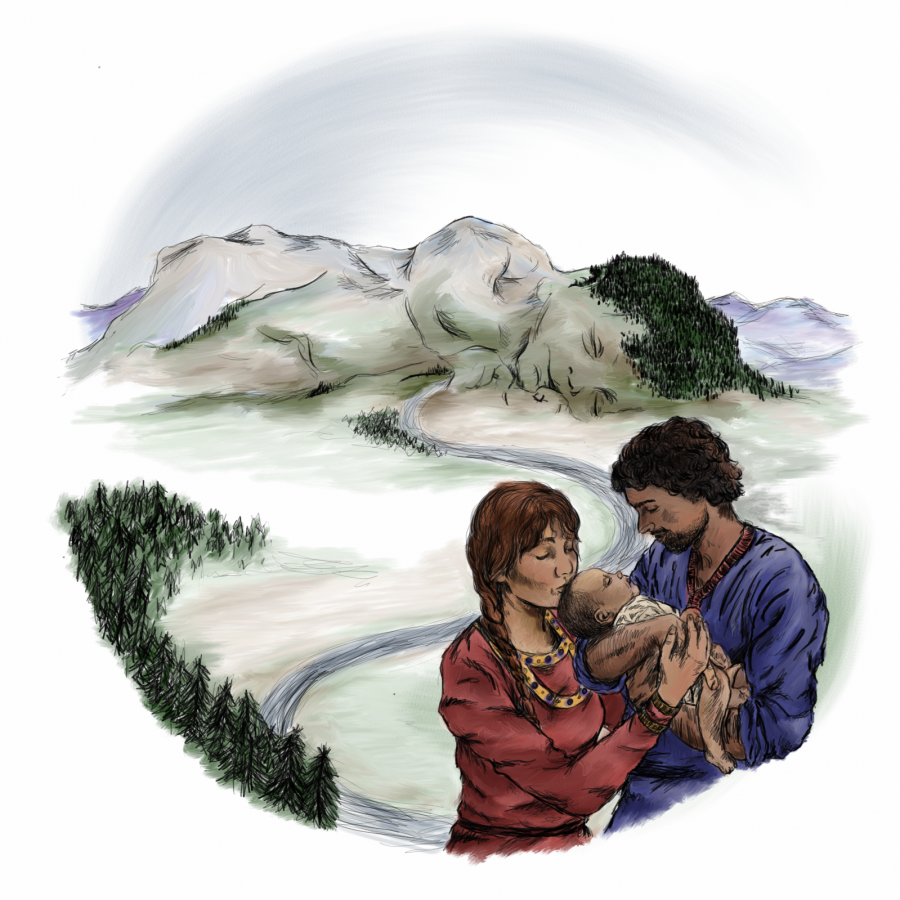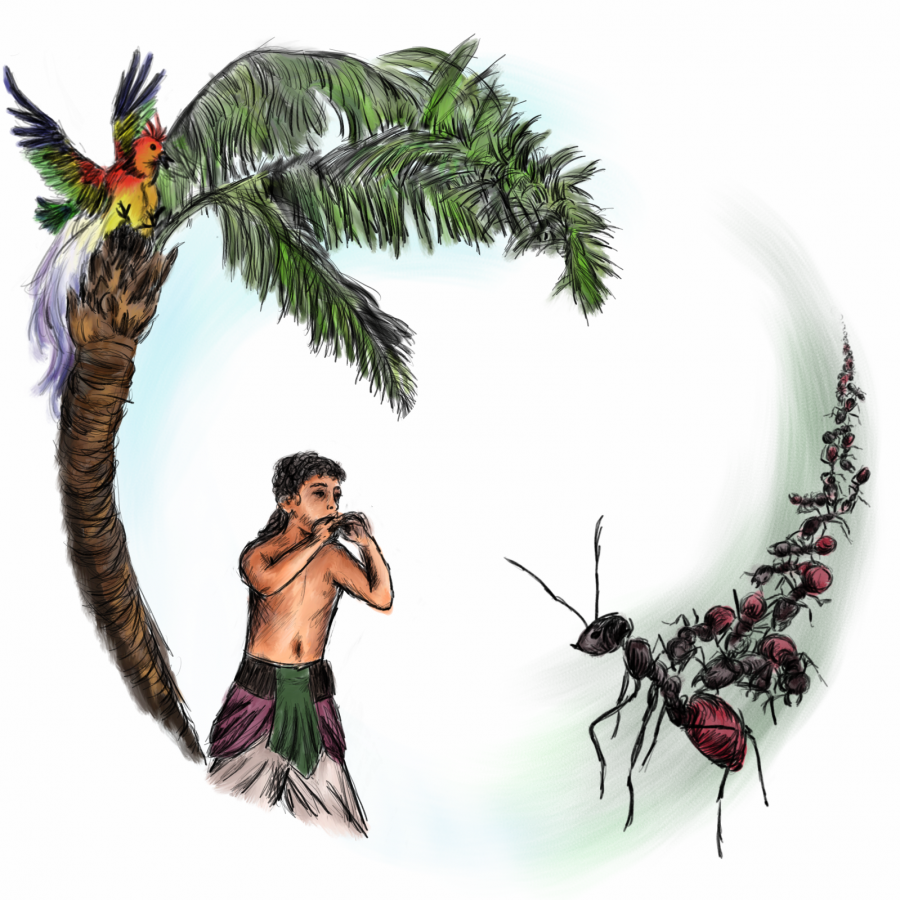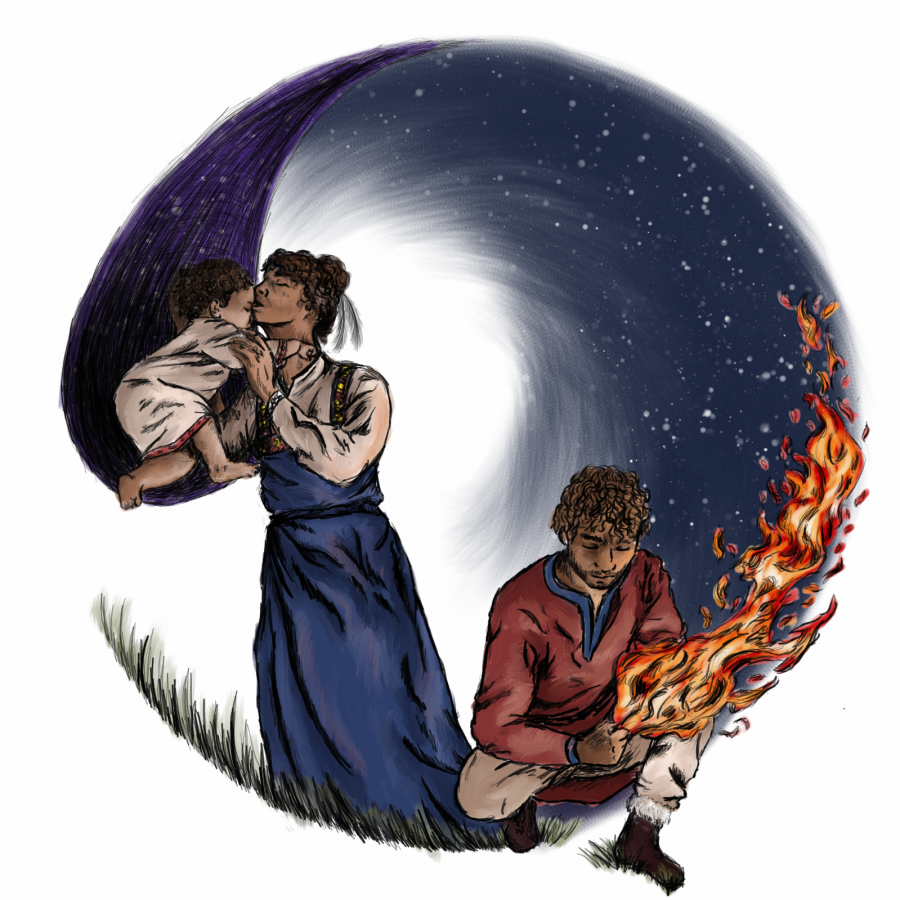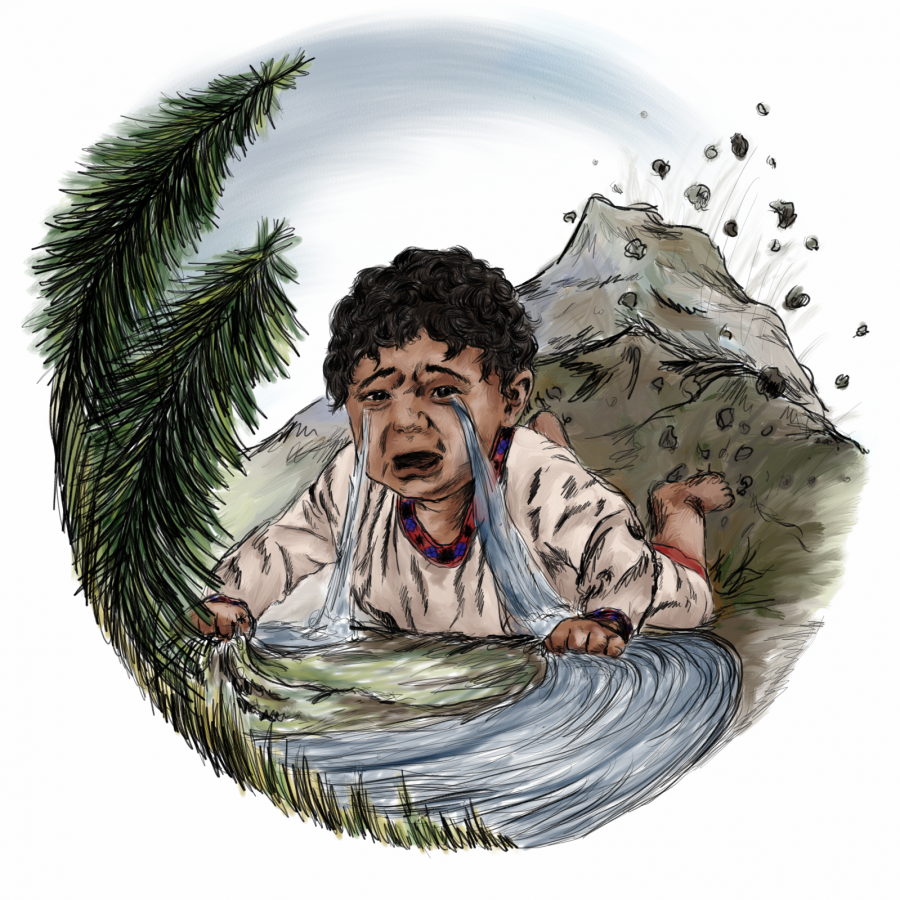In the beginning times, Taka and her younger brother Toro were rowing through a storm and crashed upon a rocky island in the sea. Taka stepped ashore and the sharp rocks cut her feet. Everywhere her blood touched, life sprung forth. The grasses and the trees took root and the people, our ancestors, arose from the drops of blood.
If I tell you a story, what will you remember? Will it be the social interactions that stick in your mind? The tricks for survival, the moral lessons—or the strange talking animals?
Will you remember more of the story if you hear it in a West Country British English accent, an Inland South American English accent, or from an “upper-class” BBC English speaker?
In our Evolutionary Human Sciences paper we tried to answer this question. What matters more: the tale or the teller? In Prestige and content biases together shape the cultural transmission of narratives, Ricky Berl and Alarna Samarasinghe (PhD students then, now fully-fledged Drs), together with Sean Roberts, Michael Gavin, and I—used storytelling and re-telling as a means to address the interactions of content and context biases in cultural transmission.
Cultural evolution researchers who are interested in how information is transmitted between individuals theorise that there are a suite of social learning biases that can influence the ways in which aspects of culture are transmitted. Simply put, not all information has an equal chance of being transmitted from one person to another. Content biases are psychological preferences for certain types of information: social information like gossip, for example, or a bias towards counter-intuitive phenomena, like talking birds. Context biases, particularly model-based biases, refer to a bias for preferential learning from certain sources: people like ourselves, for example, or people with high prestige.
In our study, we were interested in how the prestige of the “model” (the storyteller) might interact with the content of the information to be passed on (the tale). Prestige is a very hard concept to study experimentally, because you can’t easily manipulate individuals to be prestigious (or not) to all of your study participants. Luckily, some of our team’s research interests are in evolutionary linguistics and linguistic anthropology, and we were influenced by work in sociolinguistics on accent prestige. While individuals do differ in their own judgements, national ratings of accent qualities such as prestige, friendliness, and trustworthiness can be remarkably consistent.
In a couple of run-up studies, we surveyed the perceived qualities of a range of British and American English accents, and we developed a scale for assessing prestige based on accent information. We could then present stories to listeners (in the UK and the USA) in different accents that were locally-calibrated on measures of prestige. Surprisingly, there hasn’t been that much interaction between sociolinguistics and cultural evolution—odd, because researchers in both traditions are interested in the small-scale social interactions that affect the ways language and culture change over time! So we hope our study goes a little way towards inspiring more cross-over interactions between these fields.
Placing his fingers in his mouth, Toro blew a whistle so piercing that Puna fell from her perch in terror. From out of the jungle came a mass of red ants.
“Why do you call us?” they demanded in their many tiny voices.
“I am building a new island,” Toro announced, “And if you help me you can be the first to live there and can take the best homes for yourselves.”
So what did people hear in these accents? We presented people with creation narratives: stories telling the origins of people and places. Anthropologists and folklorists have collated and recorded creation stories from all over the world, and as part of our study we coded existing creation stories for the kinds of social learning biases that were present, as a baseline. But for our experiment, we commissioned a writer to create culturally non-specific stories. We wanted our participants to be unfamiliar with the stories, and we also felt it was important not to appropriate important cultural knowledge from indigenous communities.
One story tells of Taka and Toro, two jealous seafaring siblings, and their competition over the friendship of the peoples that they created on different islands [read] [listen]. The other story explains how the actions of Muki, a child abandoned by its parents, shaped a rugged landscape and the varieties of life-forms that come into being [read] [listen]. The wonderful illustrations in this blog post are by Helen Spence-Jones (she takes commissions!).
In the beginning times, Mata and Pata had run away together from the place of their people, far away beyond the realm of the sky, farther away than the stars stretch. The elder ones had not approved of their marriage and so they fled to our world here, which was then only a vast plain. They had with them their Child, Muki, who was the source of their greatest joys.
Each of the stories was carefully constructed to have proportions of content that matched our ethnographic baseline, that is, numbers of propositions that reflected so-called biases for social, survival, moral, emotional, rational, and counter-intuitive information. Then, we had speakers with different accents read and record the stories.
Participants from both the UK and the USA heard each story, one in a low- and one in a high-prestige accent. They then gave their best effort to re-tell them orally, with a clever online recording set-up. We transcribed these re-tellings, coded them for the content biases, and analysed what propositions were recalled as a function of accent prestige and a host of listener characteristics. This was an absolutely mammoth task, shouldered for the largest part by Ricky and Alarna, who can now recite those stories in their sleep! We’ve made all the transcripts available on the Open Science Framework site, and we hope they will be a wonderful rich resource for others to analyse with a host of different approaches.
Muki grabbed fists full of clay and scraped out steep valleys in the land. The Child’s tantrum churned up the hills as her kicking heels pounded in the earth. Her blood stained the clay, giving life, and she cried huge tears that became the Great River.
What did we expect to see? Back in 2013 when Mike Gavin and I were first discussing this idea, we thought it might be quite simple: we’d expect more recall overall when hearing a tale from a prestigious teller, but maybe we might see some interesting interactions with content. But we had no fixed colours to nail to the mast, or point to prove on any particular social learning bias. The important contribution was our study design, which allowed us to look at the interaction between content and models more intricately than had been done before, and which brought a real-world validity to the concept of prestige by using locally-calibrated accents.
The first finding was just how little people recalled: on average, only about 14% of the propositions in the stories. Perhaps that’s unfair, though. While listeners did know they’d be asked to recall a story, they only heard it once, and it was unfamiliar to them. People varied on overall recall, as you’d expect, but the variation had few predictors beyond a measure of working memory (you can see this in Fig 3 of the paper, below). So, if we were to do this again, one thing to vary would be the number of times people heard the story. It wasn’t practical to do this as a “live” transmission chain, but if that was possible, we could reflect a real-world storytelling environment more closely.
If you’ve read this far, you’re probably on the edge of your seat for the punchline—what is it? Prestige of teller’s accent? Or content biases in the tale?
It’s complicated (sorry!)
The prestige condition did not predict overall recall, so there’s no simple story. So asking your friend with a particular accent to record your lecture notes for revision purposes probably won’t work (for prestige reasons. It might work for other reasons!). In Figure 2 from the paper, you can also see that there’s no difference between high and low prestige accents for most of the content biases, so there are no clear patterns there.
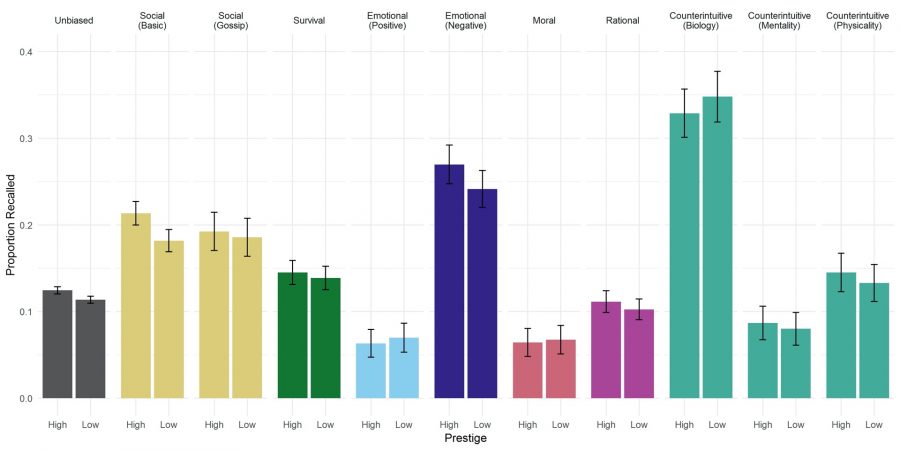
Figure 2
However, we did find that prestige impacted the recall of basic social information and “unbiased information”, that is, propositions in the stories without particular types of content predicted by theory. We then analysed a range of predictive models that included different combinations of story-based effects, the prestige condition, the presence or absence of each content bias, and participant demographics. Figure 3 shows those effects that had a positive or negative effect on recall. A number of the content biases had significant effects (odds ratios above 1): counterintuitive (biological violations), negative emotional, social, and survival biases. For a description of each of these biases, and examples, see Table 1 in the paper. Prestige had a significant effect, but this was smaller than the content. For these kinds of stories at least, some content is reliably sticky—and prestige gives listeners a leg-up as a recall strategy if the content isn’t “biased”.
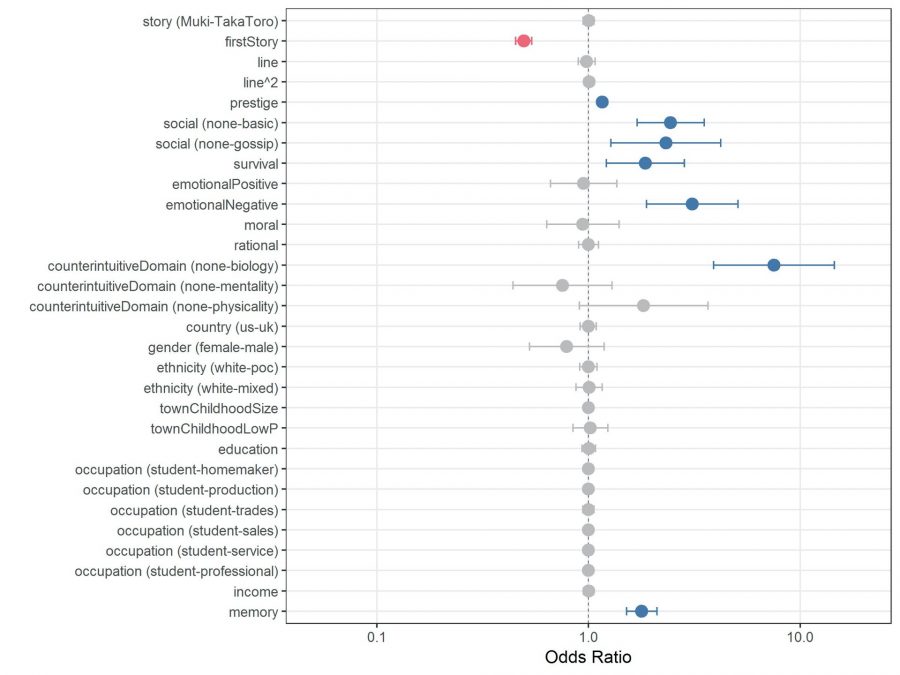
Figure 3
There’s a lot more to say, both about the work presented in the paper and the project’s approach in general, but I’m in danger of repeating the paper (do go read it and ask questions!). Despite our original simple idea (“let’s use accent prestige as a nice real-world proxy, and test content and context biases together!”) it’s fair to say that this was much harder—conceptually, logistically, and in interpretation—than we originally expected. Creation stories presented a fantastic opportunity to test as many content biases as possible, but a challenge on the other hand, because creation narratives are relatively “low-stakes” for listeners and may be best suited to testing model familiarity biases (i.e. we might expect to hear such stories in familiar voices: we address this in the paper).
As well, with hindsight I think we all wish we could have predicted the pandemic and looked at health messaging with this set-up. But hopefully others will take up the accent-prestige paradigm and use it fruitfully on all sorts of information-transmission domains! And we strongly encourage other researchers to avail themselves of the data we collected from all of our participant storytellers—there are some lovely gems in there, and we’re very grateful to all our participants.
Then out of the clay came our people, those who are our ancestors, because the land around Muki was good and fertile. The Child called Muki became the mountain that protects our village. We knew then as we do today that the Child must never be alone again, and we wait for Mata and Pata to return for her.
